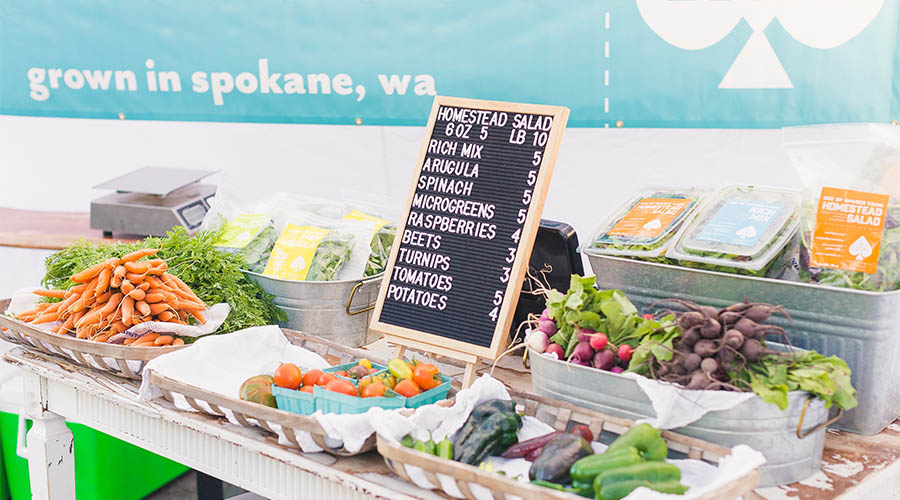A taste of the future – Trends in food and drink

The KTN AgriFood team supports researchers and businesses to drive innovation that meets evolving food and drink challenges. With this in mind, let’s take a look at some of the trends emerging in food and drink.
What food we eat, how we consume it and the way in which it reaches us is continually evolving in response to shifts in society and consumer expectations. The past 10 years have seen a number of trends emerge that have radically altered the food and drink landscape. For instance, consumers have increasingly begun to place a greater emphasis on the sustainability, ethics and origins of the food they purchase. There has also been a diversification in the way food reaches us as consumers. Although the majority of consumers continue to use large supermarkets for their grocery shopping, other options are also beginning to rise in popularity. Between 2012-2019, the proportion of shoppers using local convenience mini-supermarkets grew from 35% to 43%, whilst those using online home deliveries increased from 10% to 17%. Additionally, the popularity of out-of-home eating has risen massively alongside the expansion of food delivery platforms such as Deliveroo and Uber Eats.
Identifying what trends are likely to develop in the coming years is key for businesses if they’re to ensure they’re prepared for the future, whilst also providing exciting opportunities for innovations that might fill emerging niches and shape the future food system. Here we explore some trends that look to be developing in the food and drink area in the coming years.
The continued rise of sustainability
Perhaps one of the most significant trends in the next decade will be the continued rise in importance of sustainability and ethics. Whether it is concern for animal welfare, climate change or plastic pollution consumers are more aware of the impacts their consumption habits have. This is also creating an expectation of corporate activism from businesses, who are now expected to lead the way in addressing these societal issues.
Increased interest in plant-based diets
There is increasing interest, particularly amongst young people, in plant-based diets that consist of no or limited amounts of meat and animal products. Those following vegan diets still remain in the minority (3%), however it is the rise in individuals following flexitarian diets where significant growth is being seen. According to a 2019 Kantar survey, the consumption of plant-based meals (consisting of neither dairy or meat/fish protein) had grown by 37% within the four years up to 2019, and that 92% of plant-based meals being consumed were by non-vegans.
This switch is being led by consumers choosing foods that are considered both healthier for themselves and the planet. It is also being further driven by prominent figures and influencers, such as David Attenborough, urging us to modify our diets for the benefit of society and the environment. This recent rapid growth in the uptake of plant-based diets can be seen in Christmas 2020 behaviour, where Waitrose for example reported a seven fold increase in its vegan Christmas food pre-orders compared to 2019 6.
Such significant shifts in diet pose numerous opportunities for innovation in food and drink. Consumers are looking for alternatives that fill the same niches as meat and animal products, or even provide completely new experiences. There is an ever-growing range of meat alternatives being stocked by supermarkets, as well as a range of other plant-based alternatives that are beginning to rival traditional foods. For example, 2020 has seen the UK introduction of plant-based liquid egg substitutes, ‘Crackd’ and ‘Oggs’, that can be used in cooking and baking. Whilst in France a start-up called ‘Le Papondu’ (formerly ‘Les Merveilloeufs’) are developing a vegan friendly egg, expected to be brought to market soon, that replicate hen’s eggs and come complete with their own shells. These egg alternatives highlight how new and innovative products are beginning to emerge in all categories to disrupt the market and tap into the growing alternative plant-based category.
Plastic packaging revolution
Society’s relationship with plastic and packaging has very rapidly and visibly changed in recent years. It is an issue that was thrown into the spotlight late in 2017 by the BBC’s Blue Planet II programme that highlighted the damage plastic pollution was doing in the World’s oceans and leading to radical changes in people’s behaviours. This shift in attitude has led to a continued trend in looking to reduce plastic usage and waste so as to minimise our environmental impact.
The primary purpose of packaging in food and drink is to ensure products are protected and preserved, prolonging the life of the product so they may be consumed for longer. However, with packaging choices coming under greater scrutiny, manufacturers and retailers are expected to not only consider its primary function, but also the environmental impact of its life cycle. This has led to initiatives such as WRAP UK’s ‘Plastic Pact’ which is seeking to move organisations to a more sustainable circular plastics economy by 2025. Its targets include eliminating problematic single use packaging, using only plastic packaging that is reusable, recyclable or compostable, and incorporating 30% recycled material into plastic packaging.
In order for food and drink businesses to meet these sustainability targets and deliver low impact packaging within the coming years, innovative solutions are going to be essential. Whether that is through redesigning the packaging we use, adopting the use of alternative materials, or by rethinking the system by which products are delivered to consumers. KTN and UK Research and Innovation are supporting. The UK Circular Plastics Network, which is engaging Britain’s best scientists and innovators to help move the country towards more circular economic and sustainable approaches to plastics.
Tackling food waste
The UN Food and Agriculture Organisation (FAO) estimates a staggering 1/3 of food produced for human consumption ends up being lost or wasted. Despite this, it is a topic that has failed in the past to spark the same level of interest as other environmental concerns. However, a growing awareness of the issue and the fragilities of food supply chain highlighted during the Covid-19 pandemic have now moved the topic of food waste up the agenda, according to the global packaging company Tetra Pak.
Consumers are seen to be reflecting and taking action on their own individual contributions to food waste, as well as placing similar expectations on food and drink businesses. However, the problem of food waste is a complex one requiring both individuals and organisations to adopt different behaviours and practices, and in order to succeed will need to be supported by innovative technologies and solutions.
One way in which businesses have begun to tackle this issue has been through the creation of new products out of what were once valueless waste materials. For example, Salford based ‘Sevenbro7hers Brewing Co’ have partnered with Kellogg’s to utilise their discarded grains in the brewing process. Whilst Chip[s] Board, a KTN supported business (KTN SPARK Award Winner), have developed sustainable bioplastics produced from the potato waste of McCain UK. These exemplify how innovative solutions addressing the environmental problem of food waste are also leading to economic opportunities previously unexploited.
A renewed focus on health and wellbeing
Health has always been a major driver of trends in food and drink. However, the ongoing Covid-19 pandemic has drastically changed our lives, placing physical and mental health at the forefront of attention. Even before the pandemic, it was also clear that increasing obesity levels, an ageing population and a greater awareness of our own personal health were causing us to become more conscious of health and well-being.
This renewed focus on health is likely to see many of us adopting lifestyles that promote good health and wellbeing, a trend which will of course have major implications on the food and drink sector. Consumers will be expecting businesses to support them on this journey, making healthier lifestyles more accessible. Whether that is through enhancing and reformulating products or providing the tools, technology and knowledge that will help people achieve these aspirational lifestyles.
Data and technology’s future in food and drink
Technology has advanced dramatically over the past decade, changing the way we live and having an increasing influence on our day to day lives. The majority of us now own smartphones as well as other wearable technology (e.g. smart watches) that are capable of tracking our lifestyles and habits. The continued advance of technology, and importantly the data they collect, are likely to have a growing role in the food and drink area in the future.
Personalisation of diets and lifestyle
Over the next decade the market research firm Mintel suggest that we can expect the emergence of technology that will enable consumers to build “Smart Diets” that are personalised to our health and preferences. Already we have begun to adopt smart devices that are capable of tracking our daily lifestyles, collecting and analysing huge amounts of data that allow us to better understand ourselves. Going forward it’s likely that we’ll have even more personal data available to us that will make meeting our physical and mental health needs easier to achieve. If we choose to share it, these results will offer opportunities for food and drink companies to develop personalised recipes, diets and services that better meet our individual needs. Additionally, advances in flexible production technologies such as 3D printing may also further support personalisation in food and drink.
Time optimisers
Social shifts have meant that many of us face increasing pressures on our time. Given this, IGD propose that shoppers of the future will be looking to minimise the amount of time they spend on functional activities such as grocery shopping. Through harnessing the power of new technologies, AI and personal data it is expected that shopping will become easier, faster and more enjoyable for consumers. Freeing shoppers from the burden of such routine chores but also providing opportunities for retailers to develop and enhance in-shop experiences.
Conclusion
As has been explored here, there are a number of trends that are set to significantly change the food and drink landscape. The key drivers of these trends are generally related to tackling the environmental challenges we face as a society, as well as the significant advances in technology expected and its role in the future. However, other major events such as the current Covid-19 pandemic will also have major implications, altering the pace and trajectory of these trends and developments.
The evolution of the food and drink area will inevitably pose challenges to a number of businesses who will have to adapt if they’re to survive and succeed. However, it is also clear that it creates a multitude of new opportunities and markets ready to be exploited. Whether that is through the development of novel products, materials or technology, the food and drink sector is a fertile ground for innovation and innovative solutions to emerge.
If you’re interested in discussing innovation opportunities related to food and drink or any of the topics mentioned here please feel free to get in contact with the KTN AgriFood team at agrifood@iuk.ktn-uk.org.
This article was written by Nick Kuht, a PhD student at the University of Warwick, during his 3-month placement with the AgriFood team at KTN
Related Content
Related programme

UK Circular Plastics Network (UKCPN)
The UK Circular Plastics Network (UKCPN) aims to bring together the diverse users of plastic products and realise the best means for reducing plastic waste entering the environment through a programme of networking and knowledge-sharing events and related support activities.

